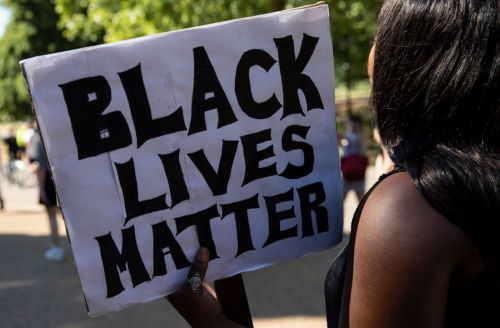10 effective ways to support protesters if you can’t get into the streets right now
Not everyone can join a George Floyd protest right now due to COVID-19, disability, and more. Here's how to help from home in impactful ways.

A weeks has passed since Minneapolis resident George Floyd died after a police officer knelt on his neck for nearly nine minutes. In that time, thousands of people have taken to the streets to protest his death and the wider problem of police brutality against Black people—not just in the United States, but around the world—than anyone could have predicted.
Still, not everyone who wants to can join the call to action. While protesting unfortunately always involves some risk, these protests happen to be taking place during a deadly pandemic which has claimed more than 100,000 lives in the United States. Given that the coronavirus is most effectively spread in large crowds—especially if people are yelling or sneezing and coughing from inhaling tear gas and pepper spray—protest environments contain an added level of serious risk right now, reports The Atlantic. For this reason and others, including anxiety, disability, lack of childcare, lack of proximity to demonstrations, and the fact that numerous cities are instituting curfews to discourage mostly peaceful protests, many people who would like to show their support have had to make the difficult decision to stay home.
However, just because you are staying home doesn’t mean that you can’t make a difference during this critical moment. There are other options for supporting protests and those who participate in them, many of which go beyond the limp-feeling signing of petitions (which you should still do). Here are a few ideas:
How to help if you can’t protest
1. Fund bail
Numerous organizations are gathering funds to support jailed protestors, and the outpouring has been so significant that several have ceased accepting donations. A few national organizations still open to donations include The Bail Project, LGBTQ Fund, Black Lives Matter, and Democratic Socialists of America. For local efforts, this list offers a good place to start. ActBlue offers a list as well. (Note: Before you donate anything to any organization, do your research!)
2. Organize supplies
Reach out to protest organizers (start with your local chapter of Black Lives Matter) to offer supplies to keep protesters safe and equipped for long hours on the street. I’ve seen some people on Instagram building individual kits to donate, which include things like masks, sunblock, snacks, water, goggles, hand towels, first aid kits, gloves, hand sanitizers, etc. While you’re in touch with organizers, ask how else you can help out from afar, too.
3. Provide transportation
If you have a car, you can help protestors by offering to drop them at protest meeting points and pick them up when the protest is over or if things go south; however, keep in mind that if you’re worried about COVID-19, you should be wearing masks and keeping car windows open for the duration of the drive.
4. Volunteer To be someone’s emergency contact
Offer to be the person protestors can call for help if they get arrested. Your role will be to notify their contacts, help them find funds for bail, and arrange to get them home from jail.
5. Offer childcare
This one is also tricky in light of coronavirus, but if it makes sense for you and the protestor you’re trying to support, offer to watch their children while they take to the streets.
6. Get involved in local politics around policing
This morning, former President Barack Obama penned a piece which included resources for getting involved in police reform. Since this is the main purpose of protests, joining these efforts is an excellent way to make a difference without protesting IRL. Check out the advocacy toolkit created by the Leadership Conference on Civil and Human Rights to get started, and pay attention to local chapters of Black Lives Matter or reference this list for more local orgs dedicated to police accountability.
7. Educate Yourself about the issues at hand
Research organizations and activists leading the charge for change in racial justice and follow them/sign up for their updates—here is an excellent resource from Black Lives Matter to get you started. (These 12 books, movies, and podcasts are great education tools, too.) Share what you see, and don’t let a fear of being wrong hold you back—it’s part of the learning process. If you’re not ready to join public discourse online, start conversations with your friends and family members instead.
8. Call out racism and disinformation online
I saw a lot of this on Twitter this weekend, and it can be just as meaningful to challenge what people are saying online about the demonstrations as it is to participate in those demonstrations. If you’re white, it’s especially important that you use your privilege to step in and speak up.
9. Offer post-protest support
Protestors are likely to be upset, scared, tired, and stressed. Offer them emotional support in addition to attending to their practical needs, e.g. food delivery, cleaning, etc.
10. Ask Black people in your community what they need
If you’re not a member of the Black community, don’t just assume you know what is helpful. Ask your Black friends, colleagues, neighbors, etc. what they would like to see you do during this time. Listen—actually listen—when they respond, and then take action accordingly.
Sign Up for Our Daily Newsletter
Get all the latest in wellness, trends, food, fitness, beauty, and more delivered right to your inbox.
Got it, you've been added to our email list.








